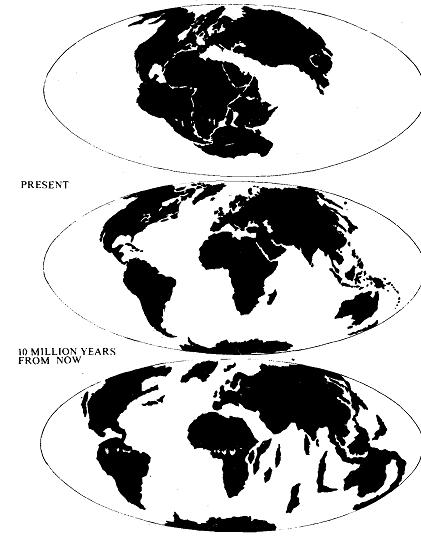The Early History of the Earth
The Earth has been evolving and changing ever since its origin, about 4.5 billion years ago. In the first tens of millions of years of the Earth's evolution, the impact of small bodies, gravitation, squeezing together of matter and some other factors heated it. This caused some of its constituents to melt. Iron melted before most of the silicates. Since it was heavier it tended to sink toward the centre, torcing up the Lighter sil~cates towards the surface, just as hot air rises over a stove. As the iron descended, the Earthls surface heaved and huge bubbles formed, with volcanoes exploding through it and lava flowing over large parts of it. There were violent storms too. At last most of the iron reached the centre, where it accumulated as the core. Slowly, the Earth cooled and quietened down. Then, a thin shell of solid rock was formed on its surface. The rock shell accumulated as the initial continents at the top of [he lithosphere, like huge rafts. These initial continents drifted about for billions of years. Scientists believe that they formed a supercontinent, which, about 200 million years ago began to drift apart to become the present continents.

The Sun's radiation had removed the gases from the Earth's surface, so the early Earth had no atmosphere. Water vapour, carbon dioxide, methane and ammonia were - - released from the molten mass and volcanic eruption and they formed the initial atmosphere. The UV rays from the Sun broke up water into its constituents, hydrogen and oxygen. Being a light gas, hydrogen escaped from the Earth. Oxygen combined with ammonia and methane to form water, nitrogen, carbon dioxide and other compounds. Higher up three atoms of oxygen combined to form ozone molecules and so the ozone layer was formed at the same time. As the Earth cooled further, water vapour in the atmosphere became condensed, and it fell as rain to fill the huge craters on the Earth. About four billion years ago, a much more remarkable process began on the Earth. This was the first feeble start of life. Paradoxically, the same UV rays that would kill most modern creatures today, helped the beginnings of life.